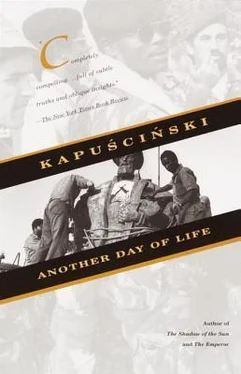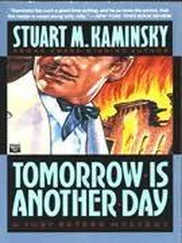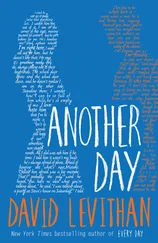She was born in Roçadas, not far from the border of Namibia. She received her military training a year ago in the Cabinda forest. She wants to become a nurse after the war. That’s all we know about this girl who is now riding in the car holding an automatic on her knees, and who, since we have run out of jokes and calmed down for a moment, has become serious and thoughtful. We know that Carlotta won’t be Alberto’s or Fernandez’s, but we don’t yet know that she will never again be anybody’s.
We have to stop again because a bridge is damaged and the drivers have to figure out how to get across. We have a few minutes, so I take a picture of her. I ask her to smile. She stands leaning against the bridge railing. Around us lie fields, meadows perhaps — I don’t remember.
After a while we drove on. We passed a burned-out village, an empty town, abandoned pineapple and tobacco plantations. Then a profusion of tamarisk shrubs that evolved into a forest. It got worse, because we were driving to the front on a road that had been fought over, and there were corpses of soldiers scattered on the asphalt. They aren’t in the habit of burying the fallen here, and the approach to every combat zone can be recognized by the inhuman odor of decaying bodies. Some additional fermentation must take place in the putrid humidity of the tropics, because the smell is intense, terrible — so stunning that, no matter how many times I went to the front, I always felt dizzy and ready to vomit. We had jerrycans full of extra gasoline in the lead car, so we stopped and poured some on the corpses, and covered them with a few dry branches and roadside bushes; then the driver fired his automatic into the asphalt at such an angle that sparks flew and a fire started. We marked our route to Balombo with these fires.
Balombo is a little town in the forest that keeps changing hands. Neither side can settle in for good because of the forest, which allows the enemy to sneak to within point-blank range under cover and suddenly attack the town. This morning Balombo was taken by an MPLA detachment of a hundred people. There is still shooting in the surrounding woods because the enemy has retreated, but not very far. In Balombo, which is devastated, not a single civilian remains— only these hundred soldiers. There is water, and the girls from the detachment approach us freshly bathed, with their wet hair wound around curling papers. Carlotta admonishes them: they shouldn’t behave as if preparing to go out for the evening; they ought to be ready to fight at all times. They complain that they had to attack in the first wave because the boys were not eager to advance. The boys strike their foreheads with their hands and say the girls are lying. They are all sixteen to eighteen years old, the age of our high school students or of the fighters in the Warsaw uprising. Part of the unit is joyriding up and down the main street on a captured tractor. Each group makes one circuit and hands the wheel over to the next one. Others have given up contending for the tractor and are riding around on captured bicycles. It is chilly in Balombo because it lies in the hills; there is a light breeze and the forest is rustling.
As the crew films, I walk along with them, snapping pictures. Carlotta, who is conscientious and doesn’t let herself be carried away in the euphoria of victory sweeping the detachment, knows that a counterattack could begin at any time, or that snipers lurking under cover could be taking aim at our heads. So she accompanies us all the time with her automatic at the ready. She is attentive and taciturn. We can hear the tops of her boots rubbing together as she walks. Carvalho, the cameraman, films Carlotta walking against the background of burned-out houses, and later against a background of strikingly exuberant adenias. All of this will be shown in Portugal, in a country that Carlotta will never see. In another country, Poland, her pictures will also appear. We are still walking through Balombo and talking. Barbosa asks her when she will get married. Oh, she can’t say— there’s a war on. The sun sinks behind the trees; twilight is approaching and we must leave. We return to the cars, which are waiting on the main street. We’re all satisfied because we have been to the front, we have film and pictures, we are alive. We get in as we did when we drove here: Carlotta in front, we in back. The driver starts the motor and puts the car in gear. And then — we all remember that it was exactly at that moment — Carlotta gets out of the car and says she is staying. “Carlotta,” Alberto says, “come with us. We’ll take you out to supper, and tomorrow we’ll take you to Lisbon.” Carlotta laughs, waves good-bye, and signals the driver to start.
We’re sad.
We drive away from Balombo on a road that grows darker and darker, and we drive into the night. We arrive late in Benguela and locate the one restaurant still open; we want something to eat. Alberto, who knows everyone here, gets us a table in the open air. It’s splendid — the air is cool and there’s an ocean of stars in the sky. We sit down hungry and exhausted and talk. The food doesn’t come for a long time. Alberto calls, but it’s noisy and nobody hears us. Then lights appear at the corner and a car comes around and brakes sharply in front of the restaurant. A tired, unwashed soldier with a dirt-smeared face jumps out of the car. He says that immediately after our departure there was an attack on Balombo and they have given up the town; in the same sentence, he says that Carlotta died in the attack.
We stood up from the table and walked into the deserted street. Each of us walked separately, alone; there was nothing to talk about. Hunched over, Alberto went first, with Carvalho behind him and Fernandez on the other side of the street, with Barbosa following and me at the end. It was better for us to reach the hotel that way and disappear from each other ’s sight. We had driven out of Balombo at a crazy speed and none of us had heard the shooting begin behind us. And so we hadn’t been fleeing. But if we had heard the shots, would we have ordered the driver to turn back so we could be with Carlotta? Would we have risked our lives to protect her, as she had risked hers to protect us in Balombo? Maybe she had died covering us as we drove away, because the boys were chasing around on the tractor and the girls were doing their hair when the enemy appeared out of nowhere.
We are all culpable in Carlotta’s death, since we agreed to let her stay behind; we could have ordered her to return. But who could have foreseen it? The most guilty are Alberto and I: we are the ones who wanted to go to the front, so Monti gave us an escort — that girl. But can we change anything now, call it off, run the day backward?
Carlotta is gone.
Who would have thought that we were seeing her in the last hour of her life? And that it was all in our hands? Why didn’t Alberto stop the driver, get out, and tell her: Come with us because otherwise we’ll stay and you’ll be responsible! Why didn’t any of us do that? And is the guilt any easier to bear because it is spread among the five of us?
Of course it was a tragic accident. That’s how, lying, we will tell the story. We can also say there was an element of predestination, of fate, to it. There was no reason for her to stay there, and furthermore it had been agreed from the start that she would return with us, In the last second she was prompted by some indefinable instinct to get out of the car, and a moment later she was dead. Let’s believe it was fate. In such situations we act in a way we can’t explain afterward. And we say, Your Honor, I don’t know how it happened, how it came to that, because in fact it began from nothing.
But Carlotta knew this war better than we did; she knew that dusk, the customary time for attack, was approaching, and that it would be better if she stayed there and organized cover for our departure. That must have been the reason for her decision. We thought of this later, when it was too late. But now can’t ask her about anything.
Читать дальше











